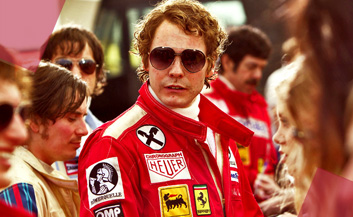The 400-Word Review: Rush
By Sean Collier
September 30, 2013
BoxOfficeProphets.com

In The Queen, it was the reaction of the royal family to the death of Princess Diana. In Frost/Nixon, it was the tense tête-à-tête between a TV host and a disgraced U.S. president. In Tinker, Tailor, Soldier, Spy, it was a network of double-crosses and subterfuge among members of British intelligence.
And in Rush, the new drama directed by Ron Howard, it’s death and victory on the Formula One racing circuit.
Among those four film, the common thread is a lack of relatability. The risks run by the drivers in Rush, like the concerns of the royals in The Queen, are not in any way applicable to the lives of the audience. While Morgan’s works have plenty to say, so to speak — Rush in particular is a meditation on risk, mortality and the ways we derive meaning in our lives — his scripts concern worlds so rarefied as to risk a certain detachment in the viewer.
They are, however, still compelling, and that’s what makes Morgan great. In Rush, seen from the perspective of three-time F1 champ Niki Lauda, two drivers in stark personal contrast vie for supremacy and pride on the distinctly dangerous Formula One circuit. Lauda (Daniel Brühl) is the analytical and cautious gearhead-nerd, cold and unlikable; James Hunt (Chris Hemsworth) is the dashing playboy, cheating death to frantically win races when not bedding supermodels, drinking heavily or sputtering before the finish line.
The rivalry between the two men and their pursuit of the 1976 F1 title drives the action, though the pacing is muddy and the film is overlong. On the strength of the performances and the vivid portrayal of the emotional reality of the period — and the visceral and gruesome consequences of even slight missteps on the track — Rush is eminently watchable and fascinating even to those with no interest in its subject.
There’s a rare gift in Rush, as well; since most American viewers have little to no familiarity with Formula One racing, let alone its champions in the 1970s, Rush is a true sports tale that can count on its audience not knowing how things will turn out. Aficionados will know what’s coming, but most will not; the ability to be shocked by true on-screen events is uncommon, and quite enjoyable.
Sean Collier is the Associate Editor of Pittsburgh Magazine and a member of the Broadcast Film Critics Association. Read more from Sean at pittsburghmagazine.com/afterdark